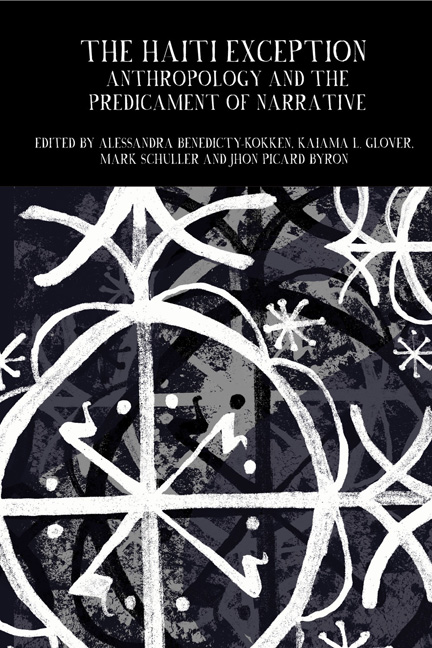Book contents
- Frontmatter
- Contents
- Editors’ Introduction
- I Tracing Intellectual Histories
- The Anthropological Uses of Haiti: A Longue Duré Approach
- Transforming Ethnology: Understanding the Stakes and Challenges of Price-Mars in the Development of Anthropology in Haiti
- On ‘being Jewish’, on ‘studying Haiti’ … Herskovits, Métraux, Race and Human Rights
- Haiti, Gender and Anthrohistory: A Mintzian Journey
- II Interrogating the Enquiring Self
- III On Nation-Building: Histories, Theories, Praxes
- Epilogue: Kalfou Danje: Situating Haitian Studies and My Own Journey within It
- Notes on Contributors
- Index
On ‘being Jewish’, on ‘studying Haiti’ … Herskovits, Métraux, Race and Human Rights
from I - Tracing Intellectual Histories
- Frontmatter
- Contents
- Editors’ Introduction
- I Tracing Intellectual Histories
- The Anthropological Uses of Haiti: A Longue Duré Approach
- Transforming Ethnology: Understanding the Stakes and Challenges of Price-Mars in the Development of Anthropology in Haiti
- On ‘being Jewish’, on ‘studying Haiti’ … Herskovits, Métraux, Race and Human Rights
- Haiti, Gender and Anthrohistory: A Mintzian Journey
- II Interrogating the Enquiring Self
- III On Nation-Building: Histories, Theories, Praxes
- Epilogue: Kalfou Danje: Situating Haitian Studies and My Own Journey within It
- Notes on Contributors
- Index
Summary
But that was a question for Mr. Sweet, for he grew up in the atmosphere of questions of life and death: the murder of millions of people in a short period of time who lived continents away from each other; on the other hand hovering over Mrs. Sweet, though she had been made to understand it as if it were a style of a skirt, or the style of the shape of a blouse, a collar, a sleeve, was a monstrosity, a distortion of human relationships: The Atlantic Slave Trade. What is the Atlantic? What is the slave trade? So asked Mr. Sweet, and he watched Mrs. Sweet […]
– Jamaica Kincaid (2013: 12)The documentary Herskovits at the Heart of Blackness (2009) asks: ‘Who has the authority to define a culture – especially if people from that culture are denied the opportunity to engage in the scholarly discourse of defining themselves? Is there a politics of knowledge?’ (Herskovits, 2009: abstract). The interviews with historian Vincent Brown, who is also the film's producer and director of research, and anthropologist Johnnetta B. C ole, in particular, question the power structures of academia. Cole asserts: ‘We don't want to be the basis on which you […] write your books and get your tenure. We want to be full participants’ (Herskovits, 2009, 51 minutes). Throughout the documentary, Kwame Anthony Appiah, Brown and Cole deliberate on their admiration for Melville Herskovits's devotion to – and in Cole's words, also his ‘entanglement’ in – the study of African and African-American life (Herskovits, 2009, 17 minutes), and his commitment to decolonization, but also his undercutting of W.E.B. Du Bois's scholarship (Herskovits, 2009, 31 minutes). To answer the documentary's overarching question, I consider how Herskovits's and Alfred Métraux's relationship both to Haiti and to what I refer to as their ‘Jewishness’ is related to a recent history of human rights that has at once racialized and also un-racialized ‘the Jew’, creating a ‘politics of knowledge’ that is fraught with complexity, ambivalence and contradictions. More specifically, I address Brown's and Cole's questioning of the legitimacy of a white anthropologist of Jewish heritage, such as Herskovits, ‘studying and positing’ himself as an expert on the experience of persons of African heritage throughout the Americas.
- Type
- Chapter
- Information
- The Haiti ExceptionAnthropology and the Predicament of Narrative, pp. 52 - 73Publisher: Liverpool University PressPrint publication year: 2016



